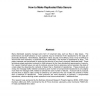Free Online Productivity Tools
i2Speak
i2Symbol
i2OCR
iTex2Img
iWeb2Print
iWeb2Shot
i2Type
iPdf2Split
iPdf2Merge
i2Bopomofo
i2Arabic
i2Style
i2Image
i2PDF
iLatex2Rtf
Sci2ools
119
click to vote
CRYPTO
1987
Springer
1987
Springer
How to Make Replicated Data Secure
Many distributed systems manage some form of long-lived data, such as files or data bases. The performance and fault-tolerance of such systems may be enhanced if the repositories for the data are physically distributed. Nevertheless, distribution makes security more difficult, since it may be difficult to ensure that each repository is physically secure, particularly if the number of repositories is large. This paper proposes new techniques for ensuring the security of long-lived, physically distributed data. These techniques adapt replication protocols for fault-tolerance to the more demanding requirements of security. For a given threshold value, one set of protocols ensures that an adversary cannot ascertain the state of a data object by observing the contents of fewer than a threshold of repositories. These protocols are cheap; the message traffic needed to tolerate a given number of compromised repositories is only slightly more than the message traffic needed to tolerate the sam...
Related Content
| Added | 28 Aug 2010 |
| Updated | 28 Aug 2010 |
| Type | Conference |
| Year | 1987 |
| Where | CRYPTO |
| Authors | Maurice Herlihy, J. D. Tygar |
Comments (0)

